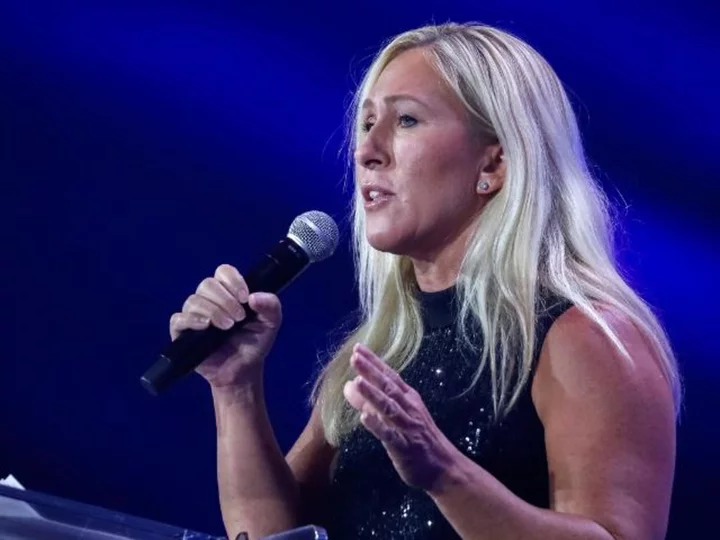TALLAHASSEE, Fla. (AP) — Debate surrounding Florida’s new restrictions on gender-affirming care focused largely on transgender children. But a new law that Republican presidential candidate and Gov. Ron DeSantis signed last month also made it difficult – even impossible – for many transgender adults to get treatment.
Eli and Lucas, trans men who are a couple, followed the discussions in the Legislature, where Democrats warned that trans children would be more prone to suicide under a ban on gender-affirming care for minors and Republicans responded with misplaced tales of mutilated kids. Eli said he and his partner felt “blindsided” when they discovered the bill contained language that would also disrupt their lives.
“There was no communication. … Nobody was really talking about it in our circles,” said Eli, 29.
Like many transgender adults in Florida, he and Lucas are now facing tough choices, including whether to uproot their lives so that they can continue to access gender-confirming care. Clinics are also trying to figure out how to operate under regulations that have made Florida a test case for restrictions on adults.
Lucas, 26, lost his access to treatment when the Orlando clinic that prescribed him hormone replacement therapy stopped providing gender-affirming care altogether. The couple also worries about staying in a state that this year enacted several other bills targeting the LGBTQ+ community.
“My entire life is here. All my friends, my family. I just got a promotion at my job, which I’m probably not to be able to keep,” Lucas, who works in a financial aid office at a college, said. “I’m losing everything except Eli and my pets moving out of here. So this was not a decision that I took lightly at all.”
The Associated Press is not using Eli’s and Lucas’ last names because they fear reprisal. While their friends and families know they are trans, most people who meet them do not.
The new law that bans gender-affirming care for minors also mandates that adult patients seeking trans health care sign an informed consent form. It also requires a physician to oversee any health care related to transitioning, and for people to see that doctor in person. Those rules have proven particularly onerous because many people received care from nurse practitioners and used telehealth. The law also made it a crime to violate the new requirements.
Another new law that allows doctors and pharmacists to refuse to treat transgender people further limits their options.
“For trans adults, it’s devastating,” said Kate Steinle, chief clinical officer at FOLX Health, which provides gender-affirming care to trans adults through telemedicine. Her company decided to open in-person clinics and hire more physicians licensed in Florida in order to continue to provide care to patients who have already enrolled, even though that represents a major change to the company's business model.
Eli has been seeing a physician for years and therefore still has access to care. But SPEKTRUM Health Inc., the Orlando clinic that prescribed Lucas hormone replacement therapy, has stopped providing gender-affirming care.
“There are a lot of people looking for care that we’re no longer legally able to provide,” said Lana Dunn, SPEKTRUM Health’s chief operating officer.
Florida has the second-largest population of transgender adults in the U.S., at an estimated 94,900 people, according to the Williams Institute at the University of California, Los Angeles School of Law. It used state-level, population-based surveys to determine its estimates. Not all transgender people seek medical interventions.
At least 19 states have now enacted laws restricting or banning gender-affirming medical care for transgender minors. But restrictions on adults haven't been part of the conversation in most places. Missouri’s attorney general tried to impose a rule in that state, but it was pulled back.
Florida is “the proving ground of what they can get away with,” Dunn said.
Her organization treats about 4,000 people — most in Florida and some out-of-state telehealth patients, she said. While SPEKTRUM has bolstered its mental health services since the law passed, it and other organizations heavily rely on nurse practitioners to provide care.
Dunn estimates that 80% of trans adults in the state were getting their health care from a nurse practitioner and now have lost access.
"Right now what we’re seeing in the community is just chaos,” Dunn said.
The law also contains language that she said could scare off doctors who would be otherwise willing to treat trans patients, such as a 20-year statute of limitations to sue over care they provide.
As a trans woman herself, Dunn is grappling with losing her own access to hormones while trying to provide support to terrified patients. That's taken “a significant emotional toll,” she said.
“Not only am I faced with this lack of care for myself but a lot of people within the community are also facing the same thing, and they’re reaching out to me for guidance,” Dunn said. “So I’m doing my best to help guide people and console them, but nobody’s really reaching out to me saying, ’How are you doing? Are you OK?'”
Lucas, who transitioned eight years ago when he was 18, anticipates running out of hormone treatments in June. In the best case scenario he can foresee now, he will be able to get a new prescription in August. He fears he might start to get his period again.
“It’s just going to be extremely difficult mentally to have your body changing in a way that doesn’t align with your brain,” Lucas said.
Eli and Lucas have switched to a month-to-month lease and tentatively plan to relocate to Minnesota in November. They said they would leave sooner if they can afford it and started an online fundraiser to help. Moving with their dog and two cats increases the expense and difficulty of finding a new place.
“I just never thought it could happen this way, this fast and to us,” Eli said.
___
Beaty reported from New York City and Schoenbaum reported from Raleigh, North Carolina.









